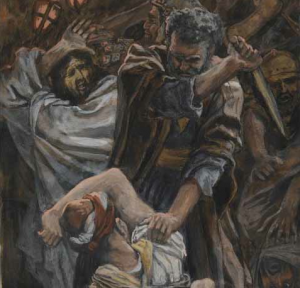This week Patheos has been generous enough to feature a series of five Holy Week meditations I wrote (Maundy Thursday, Good Friday, Holy Saturday, Easter Sunday and Bright Monday). I hope you will check them out and I hope they help you experience this week with fresh eyes.
But here's bonus track of sorts, an additional meditation on the entirety of Holy Week.
 Death hung in the air, but only he saw it. In spite of his warnings, the twelve others sitting around the table were oblivious, as they always were. In a way, he envied their ability to live in the present moment, fully and alive, without the weight he now felt. Amid the raucous laughs, his mind drifted, wondering what would become of this rabble whom he had come to love. Without him, would this fellowship slowly fracture unrecognizably? Would they run scared and try to erase from their minds all they had shared? Would that same fear lead to an anger quenched and fueled by vengeance?
Death hung in the air, but only he saw it. In spite of his warnings, the twelve others sitting around the table were oblivious, as they always were. In a way, he envied their ability to live in the present moment, fully and alive, without the weight he now felt. Amid the raucous laughs, his mind drifted, wondering what would become of this rabble whom he had come to love. Without him, would this fellowship slowly fracture unrecognizably? Would they run scared and try to erase from their minds all they had shared? Would that same fear lead to an anger quenched and fueled by vengeance?The religious law certainly would be on their side. Blood-for-blood. The people certainly wouldn't mind another attempt at an uprising to do away with the occupiers. Already, some in the room were ripe for revolution, thinking he was to be crowned king and lead the triumphalist parade through the streets. Yes, they would likely forget his teaching to do good to those that do evil. They would seek justice at the edge of blade. This is how they would remember him.
"Friends," Jesus said. The room grew quiet. He had not spoken for some time. "My time here is short. Deep down, you know it in your hearts. My time with you will soon end. I am dying. I am being put to death."
The Twelve shuffled uneasily.
"I don't want you to forget me. I want you to remember me and to honor my memory," he continued. He tore off a piece of bread and passed it around so the 12 could follow his lead. "This is my body, given for you. Do this to honor my memory."
With his usual passion, Jesus ate, letting his saliva moisten the bread and slowly chewed it, intent on savoring every last taste.
He picked up his goblet and topped it off with wine. "This is my blood, which will be spilled for you. Do this to honor my memory."
Jesus upended the cup into his mouth, his gulps embarrassingly audible. Wine stained his beard. He felt the pleasant burning of the alcohol, followed by the lingering finish of the wine.
Jesus went on to tell his disciples that he understood they would be heartbroken and angry at his death. They would curse him, betray him. And Jesus was okay with that. Just don't, he was telling them, use his death as an excuse for more bloodletting. Instead of unsheathing the sword, eat and drink with one another. Instead of retaliating with violence against his death, host a party. And invite your enemies. Lay down the claim to vigilante justice. Instead, drink wine, eat bread. Together. And remember him.
Of course, the disciples didn't get it. Just a little later, when the mob came to arrest Jesus, a sword was drawn and the high priest servant's ear was cut off. It was chaotic and it wasn't clear who did it, exactly, but everyone later suspected Peter, even though he denied it. Regardless, Jesus called out in the darkness for the violence and vengeance to stop. He healed the servant's ear and blocked off the way of revenge for his followers.
"Do this in rememberance of me."
The miracle of the crucifixion is that the disciples didn't rise up against Rome violently after the death of their lord. The miracle of Jesus is that his followers didn't band together with the zealots and try to overthrow their oppressors with violence. The miracle of all this is that, for once, the disciples got something right.
Maybe they remembered his teaching about how to resist Rome and their oppressors, with creativity rather than violence. He instructed them to turn the left cheek after being backhanded on the right, and force their attackers to strike them as equals; he told them to go an extra mile when conscripted by Rome and force the soldier to beg them to stop carrying their paraphernalia of war in public; to give their cloak and tunic to their oppressor and shame them by walking naked, unashamed. He instructed them to strike back with nonviolence, aggressive creativity, public theater.
And with what did the disciples eventually respond? A faith that included all, slave and free, man and woman, Jew and Roman, everyone willing to hammer a ploughshare out of a sword, anyone willing to throw a party and celebrate in the face of darkness, violence and oppression, those willing to see the beauty of life in spite of the famishing violence all around, those who would swear allegiance to the Reign of God's love rather than the Reign of Rome's terror.
So it is no surprise that so often the disciples don't believe the resurrected Lord to be in their presence until he breaks bread, chews a bite of fish, drains a cup of wine.
Until he joins the party of humanity again, the festival of love.